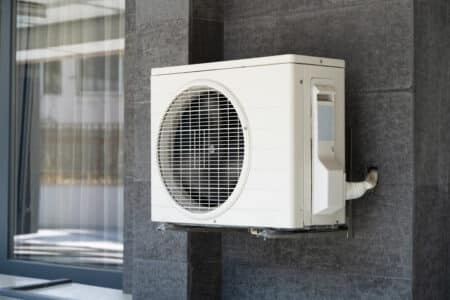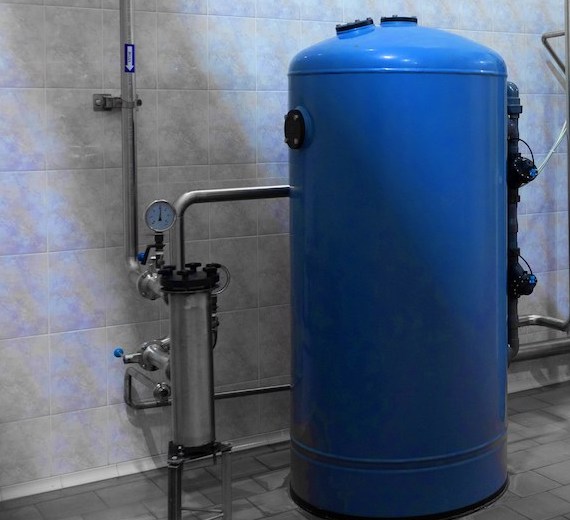Did you know that heat pumps could reduce electricity usage for heating by up to 65% compared to electric resistance heating, according to the U.S. Department of Energy?
But how much electricity does a heat pump use in different conditions? Today, we’re taking a closer look into the factors that affect a heat pump’s electricity consumption and exploring ways to optimize its efficiency for better savings.
Table of Contents
ToggleUnderstanding How Heat Pumps Work
At the core of a heat pump’s function is the process of heat transfer. During colder months, a heat pump extracts heat from the outdoor air (or ground) and moves it inside to warm your home.
When the weather gets warmer, the process reverses. The heat pump takes the heat from inside and releases it into the outdoors. This cycle, where heat is transferred and not generated, means heat pumps are more energy-efficient than other systems.
Types of Heat Pumps
There are two primary types of heat pumps: air-source and ground-source. Air-source heat pumps are the more commonly used of the two. They transfer heat between your home and the outside air.
Ground-source heat pumps transfer heat between your home and the ground. Generally speaking, ground-source heat pumps are more efficient. But the drawback is they usually cost more to install.
The type you choose will affect your electricity usage.
How Much Electricity Does a Heat Pump Use?
The way a heat pump operates and the type you select plays a big role in how much electricity it uses. Factors like outdoor temperatures, the size of your home, and the system’s efficiency rating will all influence the energy consumption of a heat pump. Understanding these elements will help you make informed decisions about your heating and cooling needs.
Factors Affecting Heat Pump Electricity Usage
Several factors influence how much electricity a heat pump uses. These factors can vary depending on your location, the size of your system, and how well your home is insulated. By understanding these elements, you can better manage your energy consumption.
There are three primary factors affecting electricity usage:
- Climate Conditions
- System Size and Capacity
- Installation Quality
Climate Conditions
The climate you live in plays a significant role in how much electricity your heat pump uses. In colder climates, a heat pump needs to work harder to extract heat from the air or ground, which increases electricity usage.
During extreme cold spells, the heat pump might rely on backup electric resistance heating, which consumes even more power. On the other hand, in milder climates, a heat pump operates more efficiently since there is less strain on the system.
System Size and Capacity
The size and capacity of your heat pump also affect electricity consumption. If your heat pump is too small for your home, it will run more frequently, using more electricity to maintain the desired temperature.
Conversely, an oversized system might cycle on and off too often, leading to inefficiency and increased energy use. Ensuring that your heat pump is appropriately sized for your space is critical to optimizing its performance and reducing electricity costs.
Installation Quality
The quality of your heat pump’s installation can greatly impact how efficiently it uses electricity. A poorly installed system might have leaks or incorrect settings that force it to work harder than necessary.
Having your heat pump correctly installed by a qualified professional can prevent these issues and help maintain energy efficiency. Proper installation ensures the system runs smoothly and doesn’t consume more electricity than needed.
SEER Rating
The SEER rating measures the cooling efficiency of a heat pump over a typical cooling season. A higher SEER rating indicates better efficiency, meaning the system can cool your home while using less electricity.
The rating is especially important if you live in a warmer climate where your heat pump is used more for cooling. Choosing a heat pump with a high SEER rating can lead to noticeable savings on your electricity bills.
HSPF Rating
The HSPF rating measures a heat pump’s efficiency during the heating season. Like SEER, a higher HSPF rating means the heat pump uses less electricity to provide the same level of heating.
The rating is particularly relevant in colder climates where heating is the system’s primary use. A heat pump with a high HSPF rating can reduce electricity usage, even during harsh winter months.
Why These Ratings Matter
Both SEER and HSPF ratings are crucial because they directly impact the amount of electricity your heat pump consumes. A system with higher ratings will generally use less electricity, making it more cost-effective in the long run. Additionally, if you live in a region like New England, it’s essential to choose a heat pump that is Energy Star Cold Climate certified. These specialized heat pumps are designed to perform efficiently in colder climates, ensuring reliable heating even in harsh winter conditions. By selecting a heat pump with strong SEER, HSPF, and Energy Star Cold Climate ratings, you can maintain comfortable indoor temperatures year-round while keeping your electricity costs in check. Comparing Heat Pumps to Other Heating Systems
When considering how much electricity a heat pump uses, it’s helpful to compare it with other heating systems. This comparison can highlight the potential benefits of a heat pump’s electricity savings and efficiency over more traditional methods.
There are three main comparisons to consider:
- Electricity usage of heat pumps versus electric furnaces
- Heat pumps compared to gas furnaces
- The efficiency of heat pumps compared to space heaters
Electric Furnaces vs. Heat Pumps
Electric furnaces generate heat by converting electricity directly into heat. The process is simple, but it’s not very efficient.
Electric furnaces use a lot of electricity to produce heat, making them more expensive to run over time. In contrast, heat pumps use electricity more efficiently by transferring heat rather than creating it. This difference in operation allows heat pumps to use significantly less electricity, especially in milder climates.
Gas Furnaces vs. Heat Pumps
Gas furnaces use natural gas to generate heat, making them a popular choice in colder regions. While gas furnaces don’t use as much electricity as heat pumps, they do rely on fossil fuels, which can be more expensive and less environmentally friendly.
Heat pumps, on the other hand, provide a more energy-efficient solution by using electricity without the need for gas. In areas where electricity is cheaper or where environmental concerns are a priority, heat pumps may be the better option.
Space Heaters vs. Heat Pumps
Space heaters are often used for quick, localized heating. But they’re generally less efficient than heat pumps. While space heaters might use less electricity in short bursts, relying on them for whole-home heating can lead to high electricity bills. Heat pumps, with their ability to distribute heat evenly throughout a home, offer a more consistent and cost-effective heating solution.
Reducing Heat Pump Costs
Reducing the electricity costs associated with your heat pump can lead to significant savings over time. There are a few practical steps you can take to ensure your heat pump runs efficiently without consuming more electricity than necessary.
There are four primary ways to reduce heat pump electricity costs:
- Regular Maintenance
- Thermostat Settings
- Supplementary Heating
- Home Insulation
Regular Maintenance
One of the most effective ways to reduce electricity costs is by keeping your heat pump well-maintained. Regular maintenance ensures that your system operates efficiently and doesn’t work harder than needed.
It includes cleaning or replacing filters, checking for leaks, and ensuring that all parts are functioning correctly. A poorly maintained heat pump can consume more electricity, leading to higher bills. Scheduling regular check-ups with a professional can prevent this and keep your system running smoothly.
Thermostat Settings
Adjusting your thermostat settings can also significantly impact electricity usage. By lowering the temperature a few degrees during colder months or raising it slightly during warmer months, you can reduce the workload on your heat pump.
Programmable thermostats allow you to set different temperatures for different times of the day, helping to optimize energy usage. Minor adjustments can lead to noticeable savings without sacrificing comfort.
Supplementary Heating
Using supplementary heating sources during extreme weather can reduce the strain on your heat pump. Space heaters or fireplaces can help warm specific areas of your home, allowing your heat pump to work less.
While it’s important not to rely on these supplementary sources too heavily, using them strategically during peak cold or heat can lower electricity costs. This approach can be particularly useful in regions with harsh winters.
Home Insulation
Good insulation is essential for reducing heat pump electricity costs. In fact, if you are considering a whole home system and looking to take advantage of the Mass Save $10,000 Whole Home Rebate, you are required to fully insulate your home according to Mass Save standards. If your home isn’t well-insulated, your heat pump will have to work harder to maintain the desired temperature. It results in higher electricity consumption.
By improving insulation in your walls, attic, and windows, you can keep warm air in during the winter and cool air in during the summer. This reduces the workload on your heat pump and leads to lower energy bills.
Heat Pump Energy Efficiency
So, how much electricity does a heat pump use? It depends on various factors, such as climate, system type, and home size.
Endless Energy has been providing stellar heating and cooling, plumbing, electrical, and insulation services in Massachusetts since 1980. We’re Mass Save certified, highly rated, and a family-run regional home services company.
Get in touch today to learn how we can help with your heat pump!





